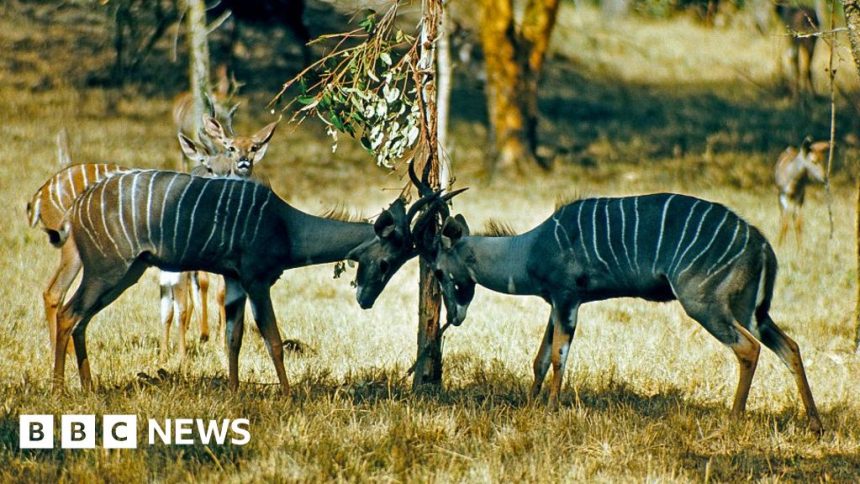Tanzania tourism: World Bank suspends funding for Ruaha National Park project
-
Published

The World Bank has halted its funding of a $150m ($120m) tourism project in Tanzania following allegations of rape, evictions and killings.
The Ruaha National Park was reportedly meant to double in size as part of the project, but critics say the expansion has led to widespread abuses.
The bank began investigating last year after it was accused of complicity in the abuses.
On Tuesday, it said it was “deeply concerned” about the allegations.
“We have therefore decided to suspend further disbursement of funds with immediate effect,” a spokesperson from the bank, which provides loans to developing countries, said.
The Resilient Natural Resource Management for Tourism and Growth (Regrow) project was launched in 2017 in an effort to improve the “management of natural resources and tourism assets” in southern Tanzania, including in a number of national parks, the bank said.
At least $100m has already been disbursed for the project, according to the US-based think tank Oakland Institute.
Work to expand the boundaries of the Ruaha National Park, a 12,950-sq-km (5,000-sq-mile)conservation area that is home to lions and other wild animals, has been under heavy scrutiny.
For over a year Oakland Institute has reported alleged abuses linked to development which, while being funded by the bank, has been carried out by the Tanzanian authorities.
The Tanzanian government had not responded to BBC requests for comment.
Last September, Oakland Institute said its research team had interviewed several villagers who alleged they were raped by rangers funded by the Regrow, (Resilient Natural Resource Management for Tourism and Growth).
In its publication, Oakland Institute also pointed to reports from a Tanzanian MP and a community organisation that rangers had allegedly killed villagers.
The think tank said government agencies had seized cattle en masse in a bid to force villagers off their land and that the Tanzanian government “blatantly” violated the bank’s procedures by planning to evict villagers without a formal plan to resettle them.
The bank had “turned a blind eye to the horrific abuses unleased onto the communities”, the report alleged.
The following month, the bank announced an investigation into the allegations.
After the bank announced it was suspending its funding of Regrow on Tuesday, Anuradha Mittal, executive director of Oakland Institute, said the “long overdue” decision was a “crucial step towards accountability and justice”.
“It sends a resounding message to the Tanzanian government that there are consequences for its rampant rights abuses taking place across the country to boost tourism.”
The think tank said villagers who “have been victims of gross human rights violations” must now receive “adequate” and “prompt” reparations.
It also said the bank must prevent the forced evictions of other villagers.
The bank said it has “robust policies” in place to prevent any potential “harmful impacts” and that it will “continue to work with the authorities and the local communities to ensure all Bank-supported projects protect and improve the lives of Tanzanians”.
Allegations of abuse are not limited to tourism projects is the south – in recent years groups like Amnesty International and Human Rights Watch have accused the government of forcibly evicting thousands of Tanzanians from the Maasai ethnic group in order to develop a game reserve in the northern Ngorongoro region.
The government has previously denied the allegations.






